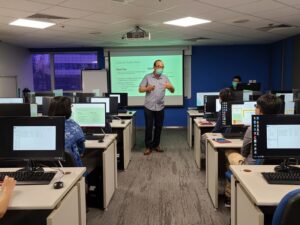 In theory, a software developer’s knowledge and “fluency” in a programming language should be an accurate gauge of his or her ability to perform well for a company. In practice, however, there are a host of skills and practices that can be learned only through on-the-job experience.
In theory, a software developer’s knowledge and “fluency” in a programming language should be an accurate gauge of his or her ability to perform well for a company. In practice, however, there are a host of skills and practices that can be learned only through on-the-job experience.
To bridge that gap and to help funnel developers to talent-hungry startups in Software Industry, Onehappy Association, the technology learning community, has created unique Happy Learning program for students as well as professionals.
What is “Happy Learning”:
Happy Learning is a program for students that emphasizes training in all round personality development, cultural and social activities. Specific skill sets may be imparted as value addition. The name reflects that it follows a school or college education and is intended to complete the educational experience. It may consist of an intensive course, or a one-year program in Software Industry.
Personality Development
An individual’s personality is an aggregate conglomeration of decisions we’ve made throughout our lives (Bradshaw). There are inherent natural, genetic, and environmental factors that contribute to the development of our personality. According to process of socialization, “personality also colors our values, beliefs, and expectations … Hereditary factors that contribute to personality development do so as a result of interactions with the particular social environment in which people live.”
There are several personality types as Katharine Cook Briggs and Isabel Briggs Myers illustrated in several personalities typology tests. These tests only provide enlightenment based on the preliminary insight scored according to the answers judged by the parameters of the test. Other theories on personality development are Jean Piaget stages of development, and personality development in Sigmund Freud’s theory being formed through the interaction of id, ego, and super-ego.
Technical Skills
A skill is the learned capacity to carry out pre-determined results often with the minimum outlay of time, energy, or both. Skills can often be divided into domain-general and domain-specific skills. For example, in the domain of work, some general skills would include time management, teamwork and leadership, self-motivation and others, whereas domain-specific skills would be useful only for a certain job. Skill usually requires certain environmental stimuli and situations to assess the level of skill being shown and used.
People need a broad range of skills in order to contribute to a modern economy and take their place in the technological society of the twenty-first century. A study showed that through technology, the workplace is changing, and so are the skills that employees must have to be able to change with it. The study identified 16 basic skills that the workplace of the future would need in the employee of the future.
The skills involved can be defined by the organization concerned, or by third party institutions. They are usually defined in terms of a skills framework, also known as a competency framework or skills matrix. This consists of a list of skills, and a grading system, with a definition of what it means to be at particular level for a given skill. To be most useful, skills management needs to be conducted as an ongoing process, with individuals assessing and updating their recorded skill sets regularly. These updates should occur at least as frequently as employees’ regular line manager reviews, and certainly when their skill sets have changed.
Moral Education
Morality (from the Latin moralities “manner, character, proper behavior”) is a system of conduct and ethics that is virtuous. Morality has three principal meanings.
In its “descriptive” sense, morality refers to personal or cultural values, codes of conduct or social mores that distinguish between right and wrong in the human society. Describing morality in this way is not making a claim about what is objectively right or wrong, but only referring to what is considered right or wrong by people. For the most part right and wrong acts are classified as such because they are thought to cause benefit or harm, but it is possible that many moral beliefs are based on prejudice, ignorance or even hatred. This sense of term is also addressed by descriptive ethics.
In its “normative” sense, morality refers directly to what is right and wrong, regardless of what people think. It could be defined as the conduct of the ideal “moral” person in a certain situation. This usage of the term is characterized by “definitive” statements such as “That act is immoral” rather than descriptive ones such as “Many believe that act is immoral.” It is often challenged by a moral skepticism, in which the unchanging existence of a rigid, universal, objective moral “truth” is rejected, and supported by moral realism, in which the existence of this “truth” is accepted. The normative usage of the term “morality” is also addressed by normative ethics.


